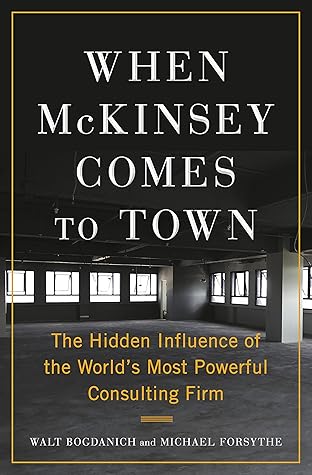More on this book
Community
Kindle Notes & Highlights
Read between
June 27 - July 1, 2024
In 1950, the chief executive of a typical large company made 20 times a production worker’s income. By 2020, CEOs made at least 351 times as much.
As these raiders got rich off what Leopold called “the deindustrialization of America,” their apologists praised them for making corporations more efficient. Some companies had indeed become complacent, but raiders often bought companies to break them up and sell off the pieces, leaving thousands of employees without jobs. “This is not the invisible hand of the market,” Leopold said. “This is the financial extraction process.”
Steven Greenhouse, the esteemed former New York Times labor writer, wrote in 2008 that offshoring, more than any other economic force since the Depression, provoked fear among American workers because it affected blue-collar and white-collar workers alike.
“They sold us on saving money,” he said, yet Missouri has among the highest per-patient Medicaid costs in the nation.
Recognizing that health care could be a major profit center, McKinsey burrowed deep into state and federal agencies by selling the idea that ordinary government workers lacked the training and experience to understand the nuances of health-care economics. The firm promoted its proprietary analytics, infused with thousands of data sets from clients around the world. No longer the domain of only generalists, McKinsey now had doctors, researchers, and former government regulators on staff.
McKinsey has also advised at least nineteen drug companies—all subject to FDA regulation—and three major drug distributors, for which it billed a grand total of at least $400 million during a recent three-year period.
For a company that expends so much effort presenting itself as a voice for health-care reform, McKinsey has remained silent on some of the most important health issues of our time. It did not lead the fight against cigarettes, vaping, and opioid abuse. (It had clients in all three sectors.) McKinsey did not speak out forcefully against the high cost of drugs or the tsunami of direct-to-consumer drug company advertisements. (Five drug company clients were called before Congress to defend price hikes and executive compensation.) Nor has the firm publicly raised alarms about the consolidation of
...more
But the idea of smart cities encompasses far more than using technology to better manage traffic or to save on electricity and water use. It also covers policing and the use of predictive analytics to help prevent crime, a fact McKinsey made clear to its audience in Chinese.
In 1992, the federal judge H. Lee Sarokin became so outraged reading industry memos in a liability lawsuit that he cast aside judicial restraint when he wrote, “All too often in the choice between the physical health of consumers and the financial well-being of business, concealment is chosen over disclosure, sales over safety, and money over morality. Who are these persons who knowingly and secretly decide to put the buying public at risk solely for the purpose of making profits and who believe that illness and death of consumers is
McKinsey followed up on RJR’s themes by invoking a technique called “funnel analysis” to reach potential customers in certain demographics, including “trendy 20s in urban areas or African Americans.” (Funnel analysis charts interactions consumers have with a company before buying their products.)
McKinsey is also a teammate of the FDA, which since 2009 has had the authority to regulate tobacco products, including Altria.
In PowerPoint slides, McKinsey recommended that J&J target “high abuse-risk patients (eg males under 40)” and move physicians who were “stuck” in prescribing less potent opioids into prescribing stronger formulations. Another slide asked, “Are we properly targeting and influencing prescription behavior in pain clinics?”
It projected that in 2019, for example, 2,484 CVS customers would either overdose or develop an opioid use disorder. A rebate of $14,810 per “event” meant that Purdue would pay CVS $36.8 million that year.
Those contracts “strongly suggest that McKinsey, while representing the FDA, was actively engaging with its private-sector clients that were the targets of this new regulatory process—an obvious conflict of interest,” the letter said.
Despite Aspen’s lofty aspirations, the “solutions” that usually emerge have a common theme: they involve little or no sacrifice from the world’s billionaires or big corporations. Instead, they focus on the private sector “doing well by doing good”—with small measures to address pressing problems that often call for collective action. It’s good PR. That’s the critique offered by Anand Giridharadas, a former McKinsey consultant and a former Aspen fellow. In a 2015 speech to his fellow fellows, he questioned the entire premise of the organization, saying it makes the rich and powerful feel
...more


